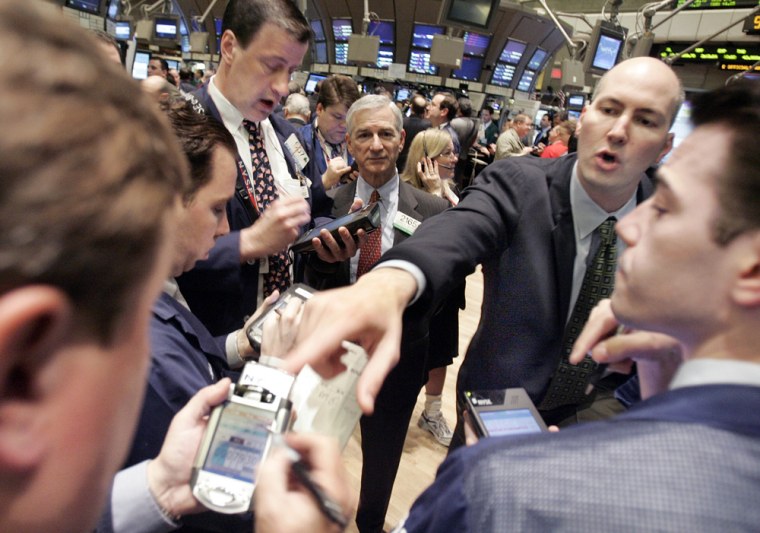Stocks tumbled again Friday, dragging the market to its lowest level in over five months, as disappointing earnings from high-tech bellwether IBM increased investors’ concerns about an economic slowdown and made them nervous about a slew of earnings reports due next week.
Profit scorecards are expected from a horde of big-name firms next week, like General Motors, Intel, Johnson & Johnson, Ford and Merck. Analysts said those reports will be a key factor in overcoming the market’s recent slump.
“Earnings are really the only hope for this market,” said Brian Pears, head equity trader at Victory Capital Management in Cleveland. “If, on the whole, earnings can go up, then we might be able to overcome oil and inflation and all the other things,” he said. “If they go down, we’ll sell off further.”
The Dow Jones industrial average was down 191.24 points, or 1.9 percent, at Friday’s close, finishing at its lowest level since Nov. 2. It was the Dow’s worst weekly decline since March 2003 and the first time since late January 2003 that the stock index has lost over 100 points in three straight sessions.
Broader indexes also tumbled. The Standard & Poor’s 500-index fell 19.43 points, or 1.7 percent, to its lowest level since Nov. 3. The technology-rich Nasdaq composite index dropped 38.56 points, or 2 percent, to its lowest close since Oct. 25.
Friday’s close capped a dismal week for stocks.
A sharp sell-off on Wall Street this week has erased all the gains the market built up in a rally that started just before November’s presidential election. For the year to date, the Dow and the S&P 500 index are both down around 6 percent, while the Nasdaq has lost 12 percent.
Shares of IBM, the world’s largest computer company, tumbled 8 percent one day after the company reported lower-than-expected earnings. That sparked Friday’s sell-off on Wall Street and sent shudders through stock markets worldwide.
IBM’s report outweighed good earnings from conglomerate General Electric, which reported higher first-quarter profit, and from Citigroup, another Dow component.
IBM was a “negative surprise” said John Hughes, managing director at Epiphany Equity Research. “It could have been offset by the GE news, but we’re in an environment where people were looking at an excuse to sell and they focused on IBM.”
News about the economy also worried investors Friday.
The Federal Reserve reported drops in manufacturing while a Labor Department report also showed higher oil costs driving up import prices and worsening Wall Street’s chronic inflation worries.
Investors looking at the Fed’s industrial output report also questioned whether higher energy and materials costs were affecting manufacturing growth as well. Overall industrial production rose 0.3 percent in March, up from 0.2 percent in February, but the increase came only from utility production due to a colder-than-average month, and manufacturing and other industrial sectors showed losses for the first time in six months.
Crude oil prices fell Friday, extending a two-week downtrend. The price of a barrel of light crude settled at $50.49, down 64 cents on the New York Mercantile Exchange.
The sharp rise in oil prices so far this year is to blame for the jump in import prices, the Labor Department said. Import costs rose 1.8 percent in March, but even without oil, prices rose 0.3 percent, which is still more than the 0.2 percent rise economists had expected.
“There’s a lot of evidence that when we have oil averaging $53 or $54 per barrel, that’s inflationary, and we got a whiff of that today in the import prices,” said Peter Cardillo, chief strategist and senior vice president with S.W. Bach & Co. “It doesn’t help that we’re starting to see the economy enter a slowing mode heading into the second quarter here.”
IBM said an inability to close deals before the end of the quarter, combined with higher pension costs, dragged on its earnings. The technology company, which missed Wall Street forecasts by 6 cents per share, hinted at a major restructuring this year. IBM tumbled $6.94, or 8.3 percent to $76.60, and was the biggest loser on the Dow.
Shares of General Electric rose 25 cents to $35.75 after the industrial and media conglomerate reported a 25 percent jump in first-quarter profits, with nine of the company’s 11 disparate divisions reporting double-digit growth. The company’s forecasts for the second quarter and full year were in line with Wall Street’s estimates.
Citigroup beat Wall Street’s expectations for its quarterly profits by 2 cents per share, with profits rising a modest 3 percent year-over-year. The financial company also said its board had authorized the repurchase of an additional $15 billion in stock. Its share price rose 35 cents to $45.75.
The lagging pharmaceutical sector saw new life after Genentech Inc. reported strong results from trials of its Avastin drug in breast cancer patients, and Ely Lilly & Co. received a favorable patent ruling on its best-selling anti-psychotic drug Zyprexa. Genentech surged $10.72, or 18 percent, to $69.35, while Lilly climbed $2.91 to $58.07.
Thursday’s losses in the U.S. had a ripple effect overseas. The Nikkei stock average fell 1.7 percent. In Europe, Britain’s FTSE 100 closed down 1.1 percent, France’s CAC-40 lost 1.9 percent and Germany’s DAX index tumbled 2 percent.
